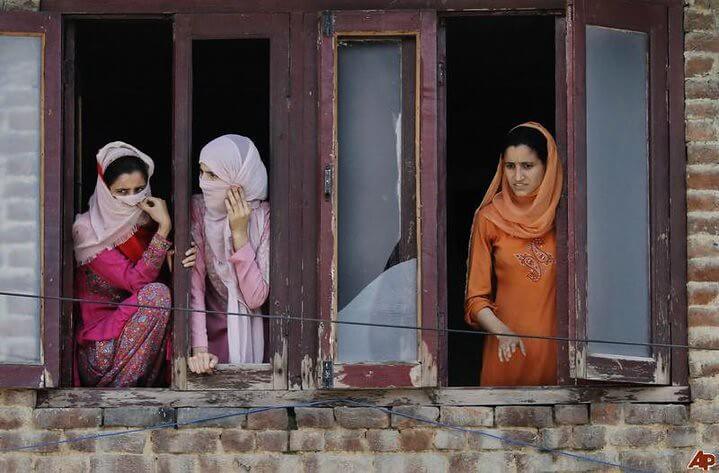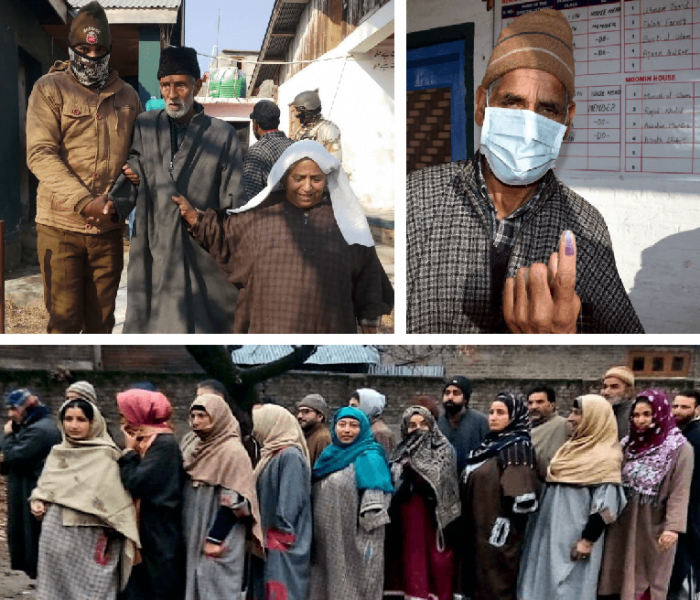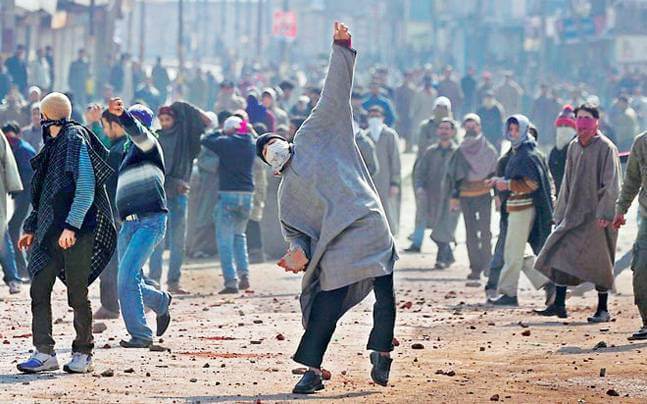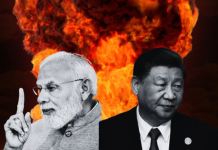On February 21, The EurAsian Times published an opinion piece, titled ‘Why Kashmir Is A True Symbol Of Multiculturalism Despite All The Issues’ by Gulam Nabi Fai, Secretary-General of the Washington-based World Kashmir Awareness Forum. Prakash Nanda, consulting editor and columnist at the EurAsian Times counters his OPED.
The Biden administration may be working towards the US rejoining the United Nations Human Rights Council (UNHRC), but the world body’s non-partisanship will always remain suspect because of its superficial views of the developments in many parts of the world where the narratives have become too routine and mediocre to be taken seriously and meaningfully. No wonder, therefore, why India “slammed” some countries in the UNHRC on February 24 for raising the Kashmir issue.
But one is writing on this issue not because of the development in the UNHRC but because on this platform on February 21 Dr. Gulam Nabi Fai, the Secretary-General, Washington-based World Kashmir Awareness Forum, wrote an opinion piece, titled ‘Why Kashmir Is A True Symbol Of Multiculturalism Despite All The Issues’. The points raised by the author need to be contested for the readers to draw their own conclusions.
Dr. Fai has been very active in Washington DC for propagating Pakistan’s version of the Kashmir dispute and influencing accordingly the US policymakers, including the members of the Congress. In fact, he was jailed in 2011 by the US Federal Bureau of Investigation for allegedly concealing the transfer of $3.5 million from Pakistan’s Inter-Services Intelligence (ISI) to fund his lobbying activities and he had pleaded “guilty”.
Therefore, it is not surprising that his piece on this platform was devoted to attacking only one “party” to the dispute, that is, India. He wrote that “India presents a wholly false picture of the situation in Kashmir” and that Indian “ploys will never be able to cover up the reality and sufferings of people in Jammu & Kashmir”.
But Dr. Fai was conspicuously silent about the woes of the people living in that part of Jammu and Kashmir that is under Pakistan’s control. He did not write a word against Pakistan’s recent annexation of Gilgit-Baltistan illegally.

Fai has argued that “India has particularly failingly tried to equate Kashmiri people with fundamentalism”, though, in reality, “A hallmark of Kashmir has been its long tradition of tolerance, amity, goodwill, and friendships across religious and cultural boundaries. It has a long tradition of moderation and non-violence. Its culture does not generate extremism or fundamentalism.” Really?
Yes, he has a point when he says that Kashmir’s “five chief religious groups Buddhists, Sikhs, Hindus, Muslims, and tiny minority of Christians – have for centuries flourished in harmony and mutual bond: no religious ghettoes; no religious apartheid; no economic or sharp cultural divides. All religious persuasions rejoiced at each other’s holidays and times of joy, attended social gatherings together, lived as neighbors in harmony, and treasured their mutual trust.”
However, the truth is that all these features did prevail in the past; but over the last three and four decades, these have become exceptions rather than the rule.
Let me quote here Haseeb Drabu, a former finance minister of Jammu and Kashmir. “Jammu and Kashmir shouldn’t be seen as a conflict state or a political problem, but as a society with social issues,” Drabu had said while addressing the “Ambassadors’ Meet” hosted by India’s PHD Chamber of Commerce and Industry in New Delhi on March 9, 2018.
“I think we have been barking up the wrong tree talking for the last 50, 70 years about the politics of it, the political situation, how it has never been improved. I think we also seriously need to correct in terms of how it is a society in search for itself,” Drabu had emphasized.
One also remembers in this context former deputy chief minister Muzaffar Hussain Baig, who, at the all-party meeting in Delhi in August 2016 had also spoken the unpalatable truth how in Kashmir “a narrative of religious extremism” is witnessing “the revival of Khilafat which has taken the form of Islamic State.
Let me quote Baig. “I told (the all-party meet) that there is a narrative of religious extremism. This narrative is created in madrasas. Our teachers and schools don’t have such commitment or reach. These kids are trained in religious texts without context. Now there is a revival of Khilafat, which has taken the form of ISIS. It is bound to influence the youth of Kashmir.
“I told them (All Party meeting) that what is taught in Madrasas is not real Islam. They teach them politicized Islam. They (the students) get two sets of kameez pajamas from their families and these vulnerable minds are told that if you die in Jihad, you will go to paradise and if you survive you will be a hero. We should have had a counter-narrative (in Kashmir)”.
It is in this context that one agrees fully with Bangladeshi scholar Abu Taher Salahuddin Ahmed that over the years, Kashmir has been witnessing three principal trends – “Indianness”, “Kashmiriness” and “Muslimness”.

The “Indianness” has been propagated by the federal forces, be it the Central Government or national parties such as the Congress and the BJP. However, the problem in Jammu and Kashmir is due to the tussle between those believing in “Kashmiriness” and those loyal to “Muslimness”.
“Kashmiriness” is an offshoot of the much-talked-about “Kashmiriyat”, which, while co-existing with “Indianness”, talks of inclusive or composite identity, binding all groups together and not offending any section.
Of course, some scholars now point out that there were always differences between Muslims and Hindus (essentially Kashmiri Pundits) in their interpretation of the concept of Kashmiriyat. But undeniably, the concept did promote coexistence. The majority of the Kashmiri Muslims, therefore, had no problems with the Hindus or for that matter with the Buddhists.
And, the key factor to the success of Kashmiriyat was the fact that the overwhelming majority of the Kashmiri Muslims believed in Sufism or what is said the “Rishi tradition” that believed in saints and shrine worships.
Of course, it was greatly facilitated by the fact that as was the case in other parts of the subcontinent, Muslims were essentially converts from the fold of Hinduism. No wonder why despite being a Muslim-majority area, beef-eating, until recently, was virtually non-existent in the Valley.
In contrast, the “Muslimness” always advocated the exclusive concepts in the Valley. Promoted by the Wahhabi and Ahl-i-Hadith sects, this school relies more on the authority of the Quran and Hadith and is totally opposed to the concept of saints and shrine worships.
This tradition or school has always been in minority in Kashmir but has always been there. It was behind organizations such as the Muslim Conference and the Kashmir Jamaat (KJ).
Needless to say that almost all the separatists and terrorists, including the so-called moderate elements like the Hurriyat Conference, belong to the school of Muslimness. They have nothing to do with India.
They have nothing to with Kashmiriyat either. For them, Kashmiri as a distinct and proud language does not exist. No wonder why Kashmiri children are no more encouraged to speak, read and write in their mother-tongue; they are forced to adapt to Urdu.
In other words, Kashmir’s present woes are essentially because of the diminishing phenomenon of “Kashmiriyat” based on the “Sufism”, the principal feature of the Muslims in the Indian subcontinent.
Sufism talks of coexistence with, not total domination over others as propounded by the fanatic Wahabism, financed and implemented by Pakistan in Kashmir. The disturbing elements in Kashmir thus are essentially Islamists, not freedom fighters that they claim to be. Just see the videos of the speeches of any Hurriyat leader to realize this point.
It may also be noted that the Islamists became active in Kashmir only after the 1979 Iranian revolution. It was after 1979 that one heard more and more of “liberation of Kashmir” and “Islamic revolution”. These elements became more vocal in politics also and formed many small political outfits.
In September 1985, 12 such outfits came together to form the Muslim United Front (MUF). Soon the MUF claimed to provide an alternative to the National Conference of Farooq Abdullah on the ground that he “sold out” Kashmiris’ interests in the Accord with the then Prime Minister Rajiv Gandhi.
In fact, it is a myth that the armed insurgency in Kashmir that began in 1989-90 was the result of the election rigging of 1987. The rigged poll might have been a catalyst, but the fact remains that during this poll campaign, the MUF had made it clear that its aim was to establish ‘Nizam-e-Mustafa’ (rule of the Prophet) in Kashmir.
One of its constituents, the Jamaat, under the leadership of one Maulana Syed Maududi (1903-1979), always urged its followers to see Islam as Nizam-e-Hayaat (a code of life) and to struggle for Islamic rule. Democracy was seen as ‘haraam’ or unIslamic.
Incidentally, the Jamaat in Kashmir had severed its ties with the outfit in India and Pakistan and became an independent entity in 1953. The same year, one of Maududi’s earnest admirers, Syed Ali Shah Geelani, became a full-time member of the Jamaat. The Kashmiri Jamaat’s rejection of India and its focus on Islamism formed the core of the separatist movement in Kashmir.

As early as 1980, the Jamaat had declared Indian forces stationed in Kashmir to be an ‘army of occupation’ and appealed to the Kashmiri Muslim youth to ‘throw out’ the Indian occupiers and establish Islamic rule in the state.
In 1987, the candidates who fought elections under the Front’s banner included Geelani and a Jamaat teacher, Mohammed Yusuf Shah, whom we now know as Syed Salahuddin, chairman of the Pakistan-based United Jihad Council, an alliance of terrorist groups!
Since then, political Islam has made firmer roots in the Valley. The Pakistani support and assistance to the cause have greatly facilitated the cause. All the separatist leaders would love Kashmir to be run by Sharia, not by democratic tenets. They want mosques or mosque-approved leaders, not any elected representatives, to control their lives.
Just see the roles the mosques are playing in aggravating the crisis in Kashmir today. It is the loudspeakers from mosques that instigate people to gather and agitate. It is in the mosques that the terrorists take shelter, knowing pretty well that the security forces will not dare enter there.
In other words, the separatists want Kashmir not only to be the sole preserve of the Muslims but be guided by a particular brand of Islam. They want Shias and non-Muslims, if at all they are allowed to live, to be second-class citizens. This is the precise reason why they want ‘azadi’ (freedom) from a democratic India, which, otherwise, houses 130 million proud Muslims.
(Views expressed in this article are those of the author)
Follow EurAsian Times on Google News




